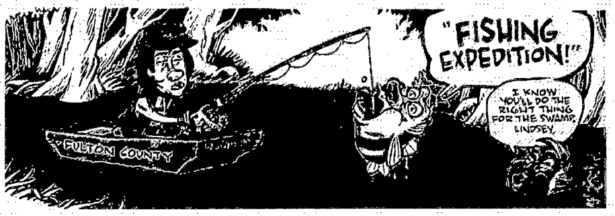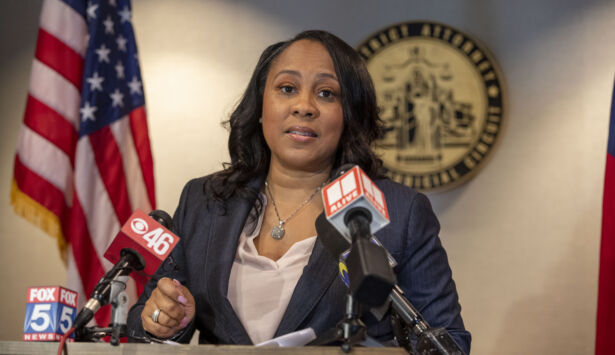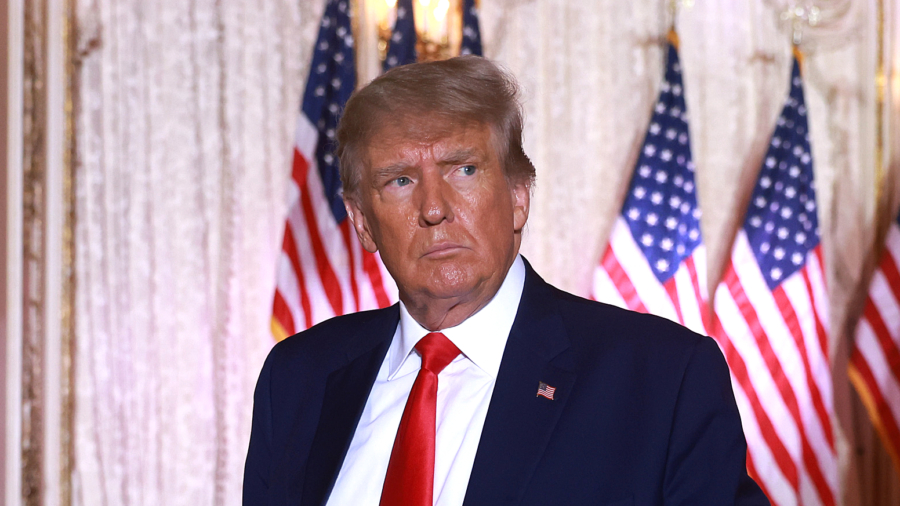An attorney for former President Donald Trump filed a motion in a state court in Georgia today to fend off an expected indictment resulting from a special purpose grand jury investigation in Georgia.
Besieged by legal challenges after announcing a 2024 presidential bid, the former president kicked off his first major counterpunch against what he calls a political “Witch Hunt” by Democrats with his Monday filing (pdf). A court ruling in Trump’s favor on this motion would dissolve one of four legal challenges that seek a criminal charge against the former president.
Trump’s motion comes as an attempt to uproot a year-long investigation on allegations that Trump and his allies engaged in election interference in the 2020 election. Initiated in early 2021 and run by Fani Willis, District Attorney of Fulton County, Georgia (“FCDA”), the investigation focused on a call between Trump and Georgia Secretary of State Brad Raffensperger in January 2021, when Trump asked Raffensperger to investigate potential voter fraud in Georgia during the 2016 presidential election. Critics of Trump have alleged that the call constituted an act of election interference. Trump has denied all allegations of wrongdoing on his part.
The grand jury, which was discharged in January, reportedly recommended indictments in its final report. In early February, the Fulton County Superior Court released a portion of the jury panel’s report, which did not include the list of names to whom indictments were recommended. It is widely expected that DA Willis will bring charges against the former president alleging election interference. In his Monday filing, Trump’s attorney Drew Findling asked the court to quash the special purpose grand jury (SPGJ) report, preclude the use of any evidence from that investigation, and disqualify Willis’s office due to a conflict of interest.
Media Tours
A key objection Findling raised in his Monday filing to the Georgia investigation is regarding media tours taken by Emily Kohrs, a foreperson of the SPGJ; DA Willis; and the judge overseeing the case. Findling alleges that these interviews compromised the case legally and judicially.
It pointed to Kohrs’s high-profile interviews with several media outlets in early 2023, including The New York Times, when she said that the jury panel recommended indictments on people who were subpoenaed, and subsequently provided the publication with some details of the proceeding.
“It is not a short list,” Kohrs told The New York Times in February, referring to the currently sealed list of indictment recommendations. She did not reveal specific names of people for whom the panel recommended indictments. Kohrs told the Atlanta Journal-Constitution in another interview on Feb. 21 that she also spoke to her boyfriend regarding her experience in the panel’s proceedings.
According to Findling, the foreperson’s media tour showed that the procedures set forth for the jury panel and the application of these procedures by the overseeing judge, Robert C. McBurney of the Superior Court of Fulton County, “failed to protect the most basic procedural and substantive constitutional rights of all individuals discussed by this investigative body.”
The harm brought by Kohrs’s publicity was compounded by additional exposure by DA Willis herself, Findling said in the filing.
“[T]he FCDA’s media interviews violate prosecutorial standards and constitute forensic misconduct, and her social media activity creates the appearance of impropriety compounding the necessity for disqualification,” the filing reads.
But even exasperating the situation are interviews conducted by the judge himself, Findling argued.
“Compounding the harm inflicted by the foreperson’s public comments, the Supervising Judge then gave numerous media interviews despite still presiding over this pending matter,” the filing continued, referring to Judge Robert C. McBurney who oversaw the case and gave media interviews after the jury’s foreperson’s media tour.
“[T]he foreperson’s and grand jurors’ comments illuminate the lack of proper instruction and supervision over the grand jury relating to clear evidentiary matters which violates the notions of fundamental fairness and due process,” the filing reads. “The results of the investigation cannot be relied upon and, therefore, must be suppressed given the constitutional violations.”
Conflict of Interest
In his Monday filing, Findling said that DA Willis’s Office must be disqualified from pursuing the case further, citing concerns related to prosecutorial misconduct and conflict of interest.
The prosecutorial misconduct aspect of Findling’s disqualification argument rests on DA Willis’s comments to the press (the motion notes she spoke to the press nearly 40 times), as well as her social media posts, which Findling said bolstered her profile as a political candidate.
One such social media post, the filing said, included a cartoon posted on Willis’s campaign Twitter account, which showed the FCDA fishing a subpoenaed witness, Graham, out of a swamp, with Trump saying, “I know you’ll do the right thing, Lindsey.”

That cartoon, Findling noted, was part of a political campaign that was threaded throughout Willis’s Georgia investigation, one in which Willis had “personal involvement and interest,” creating a “disqualifying conflict.”
“[T]he FCDA promoted her own campaign on the shoulders of partisan support for this SPGJ investigation. Within a couple of days, the FCDA’s Twitter account increased by approximately 100,000 followers, and requests for campaign donations were retweeted thousands of times,” the filing reads, referring to the alleged effect of Willis’s publicity campaign. “On at least three occasions, the FCDA personally inserted herself into this Twitter campaign for ‘followers, tweets and donations’ which specifically referenced this investigation.”
Findling alleged that Willis’s political interest, in this case, constituted a conflict of interest and thus should bar her from being further involved in the investigation.
The second reason Willis should be disqualified, according to Findling, is that Willis was ordered to be disqualified from investigating a Georgia senator because of perceived conflict of interest considerations, and that disqualification should extend to the entire case.
On July 25, 2022, the supervising judge disqualified the District Attorney’s Office from calling then-state Sen. Burt Jones to testify as a witness in the Georgia jury because DA Willis was involved in a political campaign for Charlie Bailey, then a candidate for Democratic nomination for Lieutenant Governor, who would run against Jones, the then-Republican nomination.
“She has bestowed her office’s imprimatur upon Senator Jones’s opponent. And since then, she has publicly (in her pleadings) labeled Senator Jones a ‘target’ of the grand jury’s investigation,” the judge wrote in his order, noting that Willis’s singling out of Jones constituted a perceived conflict of interest.
Findling capitalized on the judge’s disqualification order in the Monday filing, citing a 1987 decision by the United States Supreme Court (Young v. United States), which recognized “the existence of an actual conflict cannot be limited to the investigation or prosecution of one individual but is a conflict that permeates the entire proceeding.”
In other words, Findling was saying that if the judge finds that the conduct of the prosecutor ought to be disqualified from prosecuting or investigating one witness due to a conflict of interest consideration, that prosecutor must be disqualified from the case altogether.

“The rights of President Trump, as well as all others impacted by this investigation, are now subject to the prosecutorial discretion and decision-making of a prosecuting body that even the Supervising Judge acknowledged has an actual, disqualifying conflict,” the filing reads. “This is simply untenable. For this reason alone, the FCDA’s Office must be removed from any further investigation or prosecution of this matter.”
‘Unconstitutionally Vague’
In a more technical aspect, Findling argued in his Monday filing that the SPGJ spawned from “unconstitutionally vague” statutes (GA Code § 15-12-100), which violated due process and the fairness of the proceeding.
“The laws that authorized this special purpose grand jury have existed in the Georgia Code since 1974 but have rarely been utilized and even more rarely litigated. The statutes themselves are vague and have left much to interpretation; further, the case law regarding the process and function of the special purpose grand jury is similarly scant, unclear and sometimes contradictory,” Findling’s filing reads, adding that this vagueness led to a “disparate application” of the statutes and compromised the fairness of the proceeding.
Furthermore, Findling argued that the judge violated precedent when he arbitrarily declared the nature of the SPGJ as a criminal proceeding and did not offer a basis for this characterization. It continued by saying the fact that this fundamental legal question remained unclear, and was argued by multiple parties during the proceeding, shows that the statutes cited are unconstitutionally vague.
To support his claim, Findling cited objections by multiple parties whose appearance was sought by the Georgia panel, but claimed foreign immunity because they interpreted Georgia case law as allowing only civil, not criminal, investigations. These included Texas lawyer Jacki Pick Deason, Georgia Gov. Brian Kemp, and Sen. Lindsey Graham (R-S.C.). Findling argued that these parties’ objections indicate “the lack of statutory clarity on the subject.”
‘The Supervising Judge’s unilateral decision to declare the SPGJ a criminal body (despite its inability to indict and Georgia precedent to the contrary) created a litany of constitutional violations for the witnesses called before it,” the filing reads.
Jeff DiSantis, a spokesperson for Willis, did not return a call for comment by press time.
The Epoch Times contacted Trump’s spokespersons for comment.
From The Epoch Times

